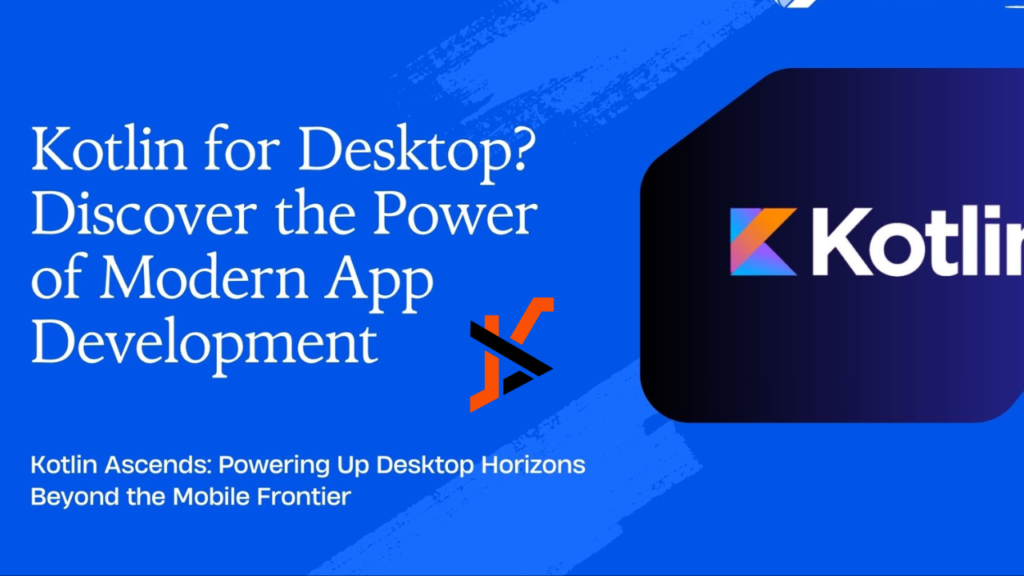We live in an era of rich technologies and development. Almost everything has become accessible, from managing finances to virtually visiting any corner of the world.
Thanks to the developers for building robust mobile applications that bridge the gap between our gadgets and emerging technologies, making our lives easier and more convenient.
To make the app development service seamless and efficient, developers can use Kotlin to compile JavaScript or Native Code and develop robust software or applications.
In this blog, we shall discuss what Kotlin is and its benefits, so continue reading.
An Overview Of Kotlin
JavaScript is a well-known programming language used for building software and applications, but it has shortcomings. Earlier developers faced challenges with JavaScript and other programming languages when developing Android apps. Then Kotlin emerged, introduced by JetBrains in 2011, to provide a more concise and expressive alternative for Android app development service.
Kotlin seamlessly collaborates with Java to ease the path for Android developers. Its features, such as null safety and coroutines, significantly enhance developers’ productivity and code-writing quality. By offering a cleaner and more efficient development experience, Kotlin has become the preferred choice for many Android developers and organizations.
Discovering Hidden Features Of Kotlin For Android Development
Although robust and efficient, Kotlin brings along several opportunities and challenges. While most developers know the language’s prominent features, some hidden features of Kotlin can improve your Android development with Kotlin. These include:
Extension Functions
This feature allows you to extend existing classes with new functionality without modifying their source code. It also enables you to enhance the functionality of third-party libraries and promote code reusability and readability.
Null Safety
Leverage Kotlin’s null safety features, such as nullable and non-nullable types, the safe call operator (?.), and the Elvis operator (?:) to eradicate NullPointerExceptions, a common source of bugs in Android development.
DSLs (Domain-Specific Languages)
Kotlin excels at defining clear and expressive DSLs. Its support for higher-order functions is key. Use DSLs to build intuitive APIs. Configure intricate components easily, like RecyclerViews, Retrofit, or custom views. Gain fluent control over complex systems. Unleash Kotlin’s strengths. Craft APIs that read like natural language.
Sealed Classes
Employ sealed classes to represent restricted class hierarchies, allowing you to define a fixed set of subclasses within a sealed class file. This feature enhances code clarity, ensures exhaustive expressions, and promotes robust pattern matching.
Smart Casts
Take advantage of Kotlin’s innovative cast feature. This feature automatically casts a variable after a type check, eliminating the need for explicit type casting in most scenarios. Smart casts reduce boilerplate code and enhance type safety and readability.
Type Aliases
Custom-type aliases make code simpler. They provide new names for complex types. This improves readability and understanding. Defining type aliases help create clear, readable code others can easily grasp.
Complex type signatures become straightforward with aliases. Type aliases enhance code documentation and maintainability. Developers understand codebase better with type aliases.
The Advantages Of Kotlin In Android App Development
In the realm of Android app development, Kotlin has emerged as a versatile and efficient programming language. It offers a wide range of benefits for Android app development, including:
Conciseness And Readability
Kotlin emphasizes simplicity, cutting extra words. Its design helps coders write shorter, cleaner code. Compared to Java’s more wordy style, Kotlin cuts the fluff. Developers can express their thoughts using fewer lines.
This streamlining promotes readable, maintainable projects. Kotlin allows efficient communication. Less repetitive stuff equals better workflow. Writing becomes straightforward yet powerful. Concise code reduces development headaches. Kotlin makes software crafting more enjoyable.
Seamless Interoperability With Java
Java and Kotlin work together seamlessly. Developers can blend Kotlin code into current Java projects and Java into Kotlin projects, too. This compatibility helps Java teams transition smoothly. They get Kotlin’s advantages without rewriting everything from scratch.
Null Safety
NullPointerExceptions (NPEs) have long been a pain point in Java development, often leading to crashes and unpredictable behavior in Android apps. Kotlin addresses this issue head-on with its robust null safety features. By distinguishing between nullable and non-nullable types at the language level, Kotlin forces developers to handle null values explicitly, thereby minimizing the risk of NPEs.
Asynchronous Programming With Coroutines
Asynchronous coding is vital in Android development, such as when you want web requests, database actions, or UI updates. Kotlin’s coroutines simplify asynchronous coding by allowing you to write it sequentially and intuitively. They are a lightweight concurrency tool that lets asynchronous code flow more naturally.
Functional Programming Paradigms
Simpler sentences help lower perplexity, while a complex one boosts clarity. Kotlin lets coders write declarative code. Higher-order functions, lambdas, and extensions aid this. These make code modular and allow the reusability of programs for streamlined operations. Embracing functional paradigms helps coders build understandable Android apps. Apps become testable and maintainable as well.
Robust Tooling And IDE Support
Google officially supports Kotlin for Android development, and Android Studio provides comprehensive support for Kotlin, including syntax highlighting, code completion, and refactoring tools. This robust tooling ecosystem enhances developer productivity and ensures a seamless Kotlin Android development experience.
Vibrant Community And Ecosystem
Android developers rapidly embraced Kotlin after Google made it official in 2017. The Kotlin community blossomed, creating tons of libraries and resources just for Android apps.
These include solutions for common issues and updates on Kotlin’s best practices. Developers use Kotlin to stay ahead with the latest Android development trends.

